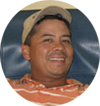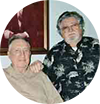Donor Stories
Jerry Bigelow
 Jerry is a 38-year old single father with four children who regularly donates plasma. "I donate because it gives me a sense of helping to contribute to those who need plasma," he says. "Although my donation may be small to me, it is good to know that it may help save a life." Jerry has personal experience with lifesaving plasma protein therapies. In 1992 during Hurricane Andrew, Jerry was taking cover in his family's garage when a gas can tipped over, spilled on him and ignited. He suffered second degree burns and received plasma products during his weeklong stay at the Miami Burn Center. Then in 2002, Jerry's four young children were injured in a fiery car crash, sustaining serious burns. One son sustained second and third degree burns over 39% of his body. Another was injured with second degree burns over 11% of his body. A third son had third degree burns over 50% of his body. And, Jerry's youngest son received the worst injuries with third degree burns over 69% of his body. The children were treated at Shriner's Burn Unit in Galveston, Texas, where they received plasma protein therapies throughout their hospitalization and recovery time. The length of hospitalization for the children ranged from one to six months. The children are doing well now and are very active. Jerry has become a dedicated plasma donor. All four of his children visit the playroom at Austin Bio Med Lab, while Jerry donates his lifesaving plasma. They enjoy coloring and playing with the other children in the playroom and have made many friends there. The center staff really enjoys having Jerry as a donor and appreciates having the chance to learn firsthand how their work helps save lives.
Jerry is a 38-year old single father with four children who regularly donates plasma. "I donate because it gives me a sense of helping to contribute to those who need plasma," he says. "Although my donation may be small to me, it is good to know that it may help save a life." Jerry has personal experience with lifesaving plasma protein therapies. In 1992 during Hurricane Andrew, Jerry was taking cover in his family's garage when a gas can tipped over, spilled on him and ignited. He suffered second degree burns and received plasma products during his weeklong stay at the Miami Burn Center. Then in 2002, Jerry's four young children were injured in a fiery car crash, sustaining serious burns. One son sustained second and third degree burns over 39% of his body. Another was injured with second degree burns over 11% of his body. A third son had third degree burns over 50% of his body. And, Jerry's youngest son received the worst injuries with third degree burns over 69% of his body. The children were treated at Shriner's Burn Unit in Galveston, Texas, where they received plasma protein therapies throughout their hospitalization and recovery time. The length of hospitalization for the children ranged from one to six months. The children are doing well now and are very active. Jerry has become a dedicated plasma donor. All four of his children visit the playroom at Austin Bio Med Lab, while Jerry donates his lifesaving plasma. They enjoy coloring and playing with the other children in the playroom and have made many friends there. The center staff really enjoys having Jerry as a donor and appreciates having the chance to learn firsthand how their work helps save lives.
Melissa Saltzman
 Born with bilateral retinoblastoma, a rare, cancerous tumor of the retina, which has rendered her blind since birth, nothing has prevented this energetic woman from believing in her ability to achieve her life's goals. Born in Milford, Neb., Melissa has done more in her 30 years than some people accomplish in a lifetime. Melissa will enthusiastically tell you her true passion in life is to love and serve others in her community. She learned about plasma donation through a friend, and didn't know what to expect when she first visited a collection center. But, within a week, she began donating. She notes how wonderful it is to donate at the facility, the employees describe every step of the process so she is fully aware of what to expect. Her adventurous personality emerges as she explains how she has gone rock climbing off Lookout Mountain in Chattanooga, Tennesse, has performed a tandem hang gliding flight, rode the Rip Cord at Worlds of Fun and went cave exploring, commonly known as "spelunking," in Georgia. She chuckles a bit when telling this story, for she explains how she became the leader of the group since she could feel her way with less difficulty than her sighted cave explorers. She finishes by noting she still wants to try bungee jumping and skydiving. In addition to her passion to love and serve others in her community, Melissa says she enjoys singing Southern Gospel and Country, taught herself to play the keyboard at age 16, the bass guitar at 27, enjoys baking and loves sports - basketball in particular.
Born with bilateral retinoblastoma, a rare, cancerous tumor of the retina, which has rendered her blind since birth, nothing has prevented this energetic woman from believing in her ability to achieve her life's goals. Born in Milford, Neb., Melissa has done more in her 30 years than some people accomplish in a lifetime. Melissa will enthusiastically tell you her true passion in life is to love and serve others in her community. She learned about plasma donation through a friend, and didn't know what to expect when she first visited a collection center. But, within a week, she began donating. She notes how wonderful it is to donate at the facility, the employees describe every step of the process so she is fully aware of what to expect. Her adventurous personality emerges as she explains how she has gone rock climbing off Lookout Mountain in Chattanooga, Tennesse, has performed a tandem hang gliding flight, rode the Rip Cord at Worlds of Fun and went cave exploring, commonly known as "spelunking," in Georgia. She chuckles a bit when telling this story, for she explains how she became the leader of the group since she could feel her way with less difficulty than her sighted cave explorers. She finishes by noting she still wants to try bungee jumping and skydiving. In addition to her passion to love and serve others in her community, Melissa says she enjoys singing Southern Gospel and Country, taught herself to play the keyboard at age 16, the bass guitar at 27, enjoys baking and loves sports - basketball in particular.
Raymond Guillory and Gordon Buffington
 When Raymond Guillory and Gordon Buffington first started donating plasma in 1967, they had no idea it would be the beginning of a life-long relationship with a new family and fellowship with a community of donors. Eager to do their part for the greater good, they began a journey together to help families, and have amassed 40 years of loyal and dedicated giving.
When Raymond Guillory and Gordon Buffington first started donating plasma in 1967, they had no idea it would be the beginning of a life-long relationship with a new family and fellowship with a community of donors. Eager to do their part for the greater good, they began a journey together to help families, and have amassed 40 years of loyal and dedicated giving.
Guillory, a construction lineman from Sulphur, Louisiana, had donated blood and was identified as having a red cell antibody, the Anti-D. The blood center informed him that this antibody found in his plasma was needed to manufacture a vaccine that would help save newborn babies. He wanted to help, but was unsure about committing to donating plasma twice each week; and of receiving red blood cells from someone else to increase the strength of his antibody. His doctor confirmed that the process was safe and that donating plasma was a good thing. Guillory donated his first unit of plasma in January, l968 and has driven 80 miles, round trip, two times a week to donate after work. At age 74, he is still committed to the cause and, his wife of more than 50 years, Gussie, goes too. When asked why he decided to become a donor, Guillory replied, "to help better humanity." He said he has reaped benefits, that he never would have imagined forming friendships of a lifetime with staff and donors especially Gordon Buffington.
Gordon didn't have the antibody needed for Rh immune globulin, but was a good candidate for developing it. After being immunized several times and developing the Anti-D, Buffington, donated his first unit of plasma in January of l968. He is famous for his Cajun gumbo, which he shares with the plasma collection center staff. When asked how being a plasma donor has affected his life, Buffington says he has been enriched by associating with the people there. He continues, saying that being with the staff is like being with his grandchildren. Even new donors eventually get the hang of it and fit in, he notes. Why does Buffington still donate? "Because of the need," he insists. He also feels that donating is good for him; that it helps keep him young and in good physical shape. He says, too, that going into the center is like seeing and being with family several times a week.
Raymond and Gordon have silently and anonymously touched the lives of thousands of families worldwide. Their dedication is to help people; they believe that it is an opportunity and a responsibility, with no hourly parameter governing their willingness and generosity. And they continue to come and maintain the relationships developed over the decades, unique kinships that will keep them and others donating for years to come.
Ralf Reidel
Ralf Riedel has donated plasma 430 times. After escaping East Germany in 1989, Reidel settled in Austria where he still lives. He still works as a programmer for a 3-D-laser cutting line, producing prototypes for the automotive industry. He started donating plasma when the center in 1990s. When asked why he decided to become a donor, Riedel replied, "I always had a social attitude. While I would not describe myself as somebody with a helper's syndrome, I am somebody who usually gives more than he asks back and when I discovered plasma donation I thought that was a great way to help other people without real discomfort." Two other factors influenced his willingness to donate. As a climber and a former biker, he lost several good friends in accidents. Although, he was unable to help them, the idea that in his donation could contribute saving live was very encouraging. In addition, the birth of his daughter Romana in 1997 inspired him to contribute to something larger, so that in case his daughter might need a transfusion or a replacement therapy she might get it. With the investment of a few hours per donation for more than 20 years, Ralf Riedel has contributed to improving and to saving a multitude of lives. In his modest way, he has assumed responsibility for a larger cause and to help other people without getting anything in return.
Copyright © 2023 PPTA. All rights reserved. Sitemap | Privacy Policy
Realisation by Welldotcom - Puntgaaf Internetbureau




